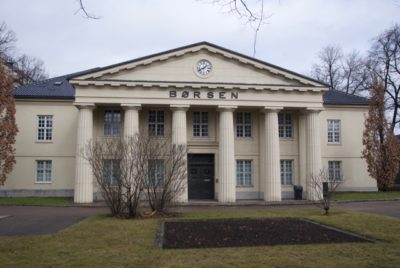Norway’s stock market was battered on Monday along with many others around the world. The Oslo Stock Exchange (OSE)’s main index fell 2.99 percent, making it one of the worst trading days of the year so far.

The OSE’s main index closed at 1.226.11, marking a decline of 4.44 percent during the past week. Analysts point to a fall in the price of Norway’s North Sea Brent crude oil, along with rising inflation because of shortages caused by the pandemic (still a crisis in China) and Russia’s war on Ukraine.
It’s the oil price dive that usually affects both Norwegian stocks and Norway’s currency the most. Norway’s krone has been losing value during the past few days, and on Monday afternoon it cost more than NOK 9 to buy one US dollar. That’s up from NOK 8.82 just last week.
All of Norway’s biggest companies were battered on Monday, with Norsk Hydro shares diving 8.5 percent, Aker BP falling 5.93 and Equinor down 4.18 percent. Commentators viewed the declines as more than just a “market correction.”
The Norwegian economy has generally held up well during both the Corona- and Ukraine crises, but some analysts are now warning of ongoing and major declines in share values. Newspaper Dagens Næringsliv (DN) reported late Monday afternoon that investor Peter Hermanrud, for example, is predicting an Oslo stock market fall of as much as 30- to 50 percent and warning of “a real economic downturn around the world” during the next year or two because of inflation and even a possible recession.
“We’re seeing signs of ‘demand destruction’ for the first time,” Hermanrud told DN. “I don’t think it’s possible to fight inflation without an economic downturn.” He points especially to labour shortages, especially in the US, that are driving up wages: “As long as there’s so much demand for workers, pay will only keep rising and then you get more inflation. It will be necessary to raise unemployment.”
It’s bitterly ironic, since job creation has long been so politically important in Norway. Now, as former Norwegian Prime Minister Erna Solberg said recently, “there are more jobs than workers.” Employers keep resisting wage hike demands, but some are forced to offer higher compensation in order to keep operating or avoid strikes. That can fuel inflation, and send interest rates higher after years of rock-botton levels.
Several economists have maintained upbeat economic outlooks for Norway, and think the economy will keep growing. Norway’s huge sovereign wealth fund known as the Oil Fund will be hit by falling share prices, since it invests mostly in stock markets outside Norway, but it’s also grown phenomenally in recent years. Long-term growth for what’s essentially a pension fund remains likely.
Kari Due-Andresen, chief economist for Akershus Eiendom in Oslo and formerly in a major bank, said central banks are trying to carefully boost interest rates in order to dampen demand and price rises. The US Federal Reserve is likely to raise rates in May, while Norway’s central bank has already warned of several probably quarter-point hikes in its policy rate over the next two years.
newsinenglish.no/Nina Berglund

